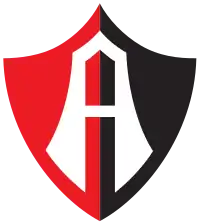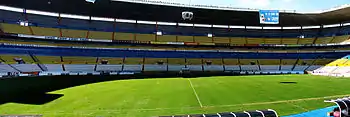Atlas F.C.
Atlas Fútbol Club (Spanish pronunciation: [ˈatɬas ˈfuðβol ˈkluβ]) is a Mexican football club. It plays home matches at the Estadio Jalisco, Guadalajara, Jalisco.
 | ||||
| Full name | Atlas Fútbol Club | |||
|---|---|---|---|---|
| Nickname(s) | Los Zorros (The Foxes) Los Rojinegros (The Red-and-Blacks) La Academia (The Academy) | |||
| Founded | 15 August 1916 | |||
| Ground | Estadio Jalisco | |||
| Capacity | 55,110[1] | |||
| Owner | Grupo Orlegi | |||
| Chairman | José Riestra | |||
| Manager | Diego Cocca | |||
| League | Liga MX | |||
| Guardianes 2020 | 16th | |||
| Website | Club website | |||
|
| ||||
History
Club Atlas was founded in a bar of Guadalajara, Mexico, where a few friends recalled their football experience at the Ampleforth College where they had spent the last few years. Alfonso and Juan José "Lico" Cortina, Pedro "Perico" and Carlos Fernández del Valle, the three Orendain brothers and Federico Collignon (who had studied in Berlin) finally decided in 1916 to set up a football team called "Club Atlas" and founded it in Guadalajara.
The technical ability that the "Atlistas" employed – triangular passing and skillful dribbling to avoid opponents' tackles – was impressive and they quickly joined the elite in Mexican football. As a result, Atlas and Chivas, a fellow Guadalajara team, have a long history in the first division and the game between them is called the 'Clásico Tapatío'.
Club Atlas had a golden age in the late 1990s under the management of Ricardo La Volpe, with promising players such as Rafael Márquez, Daniel Osorno, Juan Pablo Rodriguez, Pavel Pardo, Mario Méndez, Omar Briceño, Miguel Zepeda, and Cesar Andrade, but even though they had a team with enormous talent and reached the Verano 1999 final, they couldn't conquer the title and lost against Deportivo Toluca F.C. in a match defined by penalties.
Youth Academy
Atlas are renowned for having a successful youth academy setup. In the last few decades, Atlas have developed many players who have gone on to have professional careers domestically and internationally. Many young players enter the Atlas youth academy knowing that they'll have a strong possibility to play with the first team due to the club philosophy of allowing youth players the opportunity to be promoted to the first team. Although Atlas has only won the league championship once, their academy has been famous for developing players for the Mexico national football team in the past few decades like Jared Borgetti, Daniel Osorno, José de Jesús Corona, Pável Pardo, Oswaldo Sánchez, Rafael Márquez, Juan Carlos Medina, Jorge Hernández, Mario Méndez, Miguel Zepeda, Juan Pablo Rodriguez, Juan Pablo Garcia, Hugo Ayala, Jorge Torres Nilo, Edgar Ivan Pacheco, Andrés Guardado and many more. The club's lower youth divisions have achieved many titles domestically as well as internationally.
International competitions

Atlas has participated twice in Copa Libertadores. The first appearance was in 2000 after qualifying through a preliminary round-robin stage where they faced Club America, Deportivo Tachira and Deportivo Italchacao. They got off to a bad start losing 2–0 to America then drawing with Deportivo Tachira 2–2 and 3–3 with Deportivo Italchacao. However they would recover and finish first of the group after defeating Club America 6–3, Deportivo Tachira 2–0 and drawing 2–2 with Deportivo Italchacao on the second legs.
Atlas would then be drawn into Group 4 alongside River Plate, Universidad de Chile and Atletico Nacional. At home they would draw 1–1 with River Plate, draw 0–0 with Universidad de Chile and defeat Atletico Nacional 5–1. In the second legs they would defeat Atletico Nacional by a score of 3–2 but lose to both River Plate and Universidad de Chile by the same score. Atlas would go on to finish 2nd in the group with just a point behind River Plate and leveled in points with Universidad de Chile but a better goal difference would see them go through. After having impressed in the group stage they would eliminate Junior of Barranquilla in the Round of 16 with scores of 2–0 and 3–1. However, in the quarterfinals their run would come to an end after losing twice to Palmeiras with scores of 2–0 and 3–2.
Their second appearance was in the year 2008 after first having to earn a ticket by participating in the qualifying tournament known as the Interliga where they faced Toluca, Morelia and Club America. After a goalless draw to Toluca, a 2–0 victory over Morelia and a 3–2 defeat to Club America, they would find themselves second of the group and statistically leveled with Toluca in every possible way. Given the circumstances, a coin toss was issued in which Atlas ended up winning. Having finished second they lost their opportunity to automatically qualify for the Copa Libertadores and had to play San Luis for a ticket to the Copa Libertadores First Stage. They would defeat San Luis easily by a score of 3–0.
In the preliminary First Stage Atlas faced the Bolivian team La Paz and defeated them 2–0 at the Jalisco then they lost 1–0 in La Paz and so with a 2–1 aggregate they would finally earn their ticket and be drawn in group 3 with Boca Juniors, Colo-Colo and Maracaibo. Atlas were impressive and finished first in the group with 11 points. At home they defeated Boca Juniors 3–1 and defeated both Colo-Colo as well as Maracaibo with a score of 3–0. Away from home they drew 1–1 with Maracaibo and Colo-Colo but lost 3–0 to Boca Juniors. In the Round of 16 they would eliminate Lanus with scores of 1–0 and 2–2 at home. In the quarterfinals they would face Boca Juniors once again. The first match was played at the Jose Amalfitani stadium due to the sanction that was imposed on Boca Juniors. The game was spectacular, undoubtedly one of the best of the tournament. Atlas went ahead early on by a headed goal from Omar Flores then Boca Juniors would tie after an own goal from Hugo Ayala. Both teams would have several goal scoring chances throughout the game and 15 minutes before the end of the match, Caceres would put Boca up 2–1. However, in the 88th minute Atlas would equalize from a set piece from a sensational header from Jorge Torres. So with much optimism the team would head home to receive the Argentines at the Jalisco. In the second game Atlas were not so fortunate. They suffered early injuries but the worst was yet to come for them as Palermo would have a memorable hat-trick before half time. The game ultimately ended 3–0 and Atlas once again find themselves knocked out in the quarterfinals.
In their third appearance, led by coach Tomás Boy they lost at Home against Santa Fe 1–0. They were obligated to get a win in their next visit against Atletico Mineiro which they defeated with a goal scored by Christian Suarez in the 86th minute which gave them the Victory 1–0 and ended a 37-year undefeated streak at Home in Copa Libertadores for Atletico Mineiro.
Estadio Jalisco
Atlas currently plays in the Estadio Jalisco, which is the third largest stadium in Mexico and was constructed on 31 January 1960. It is a venue that has played host to historic matches and teams including Pelé's Brazil in 1970. In total, It was host for 8 games in the 1970 FIFA World Cup, 6 of which were from group stage matches, and two were quarter and semi-finals. Subsequently, the stadium was again host for 9 games in the 1986 FIFA World Cup, 6 of which were group stage matches, 1 was round of sixteen and the last 2 were quarter and semi-finals.
Supporters and rivalry
Atlas fans are as a whole collectively known as La Fiel (The Faithful), while La Barra 51 is the main organized supporter group. La Barra 51's name recalls Atlas' last and only championship in the Primera División de México in 1951. Through the team's struggling performance La Fiel has earned its name, supporting the team for 60 years without any major accomplishments.
Clásico Tapatío
Atlas' fierce rivals are Guadalajara city-rivals C.D. Guadalajara, known as Chivas. The derby is known as the Clásico Tapatío and is said to be the oldest football derby in Mexico, dating back to 1916. The first match between the two sides was a friendly that took place shortly after Atlas were founded, the game ended 0–0. The first competitive match between the two sides came in the 1917 "Torneo de Primavera", which translates into English as the "Tournament of Spring". Atlas were victorious this time round, winning 2–1. The game sparked controversy, however, when complaints of a bad refereeing performance were put forward by Chivas. Chivas were so angered by the result, that they refused to play in the next "Liga Amateur de Jalisco" tournament of 1917–18, unless the president of refereeing, Justo García Godoy, resigned from his position; when Godoy failed to do so, Chivas refused to join the tournament.
Chivas are the most victorious in Guadalajara derbies, however, winning 16 of 35 competitive fixtures the two sides have played. Atlas have only won 9 and the sides have drawn 8 times.
Personnel
Coaching staff
| Position | Staff |
|---|---|
| Manager | |
| Assistant manager | |
| Goalkeeper coach | |
| Fitness coaches | |
| Physiotherapist | |
| Team doctor |
Players
First-team squad
Updated 8 January 2021
Note: Flags indicate national team as defined under FIFA eligibility rules. Players may hold more than one non-FIFA nationality.
|
|
Out on loan
|
|
Reserve teams
Shirt sponsors and manufacturers
Managers
|
|
Honours
- Liga MX: 1
- 1950–51
- Runner-up (3): 1948–49, 1965–66, Verano 1999
- Copa MX: 4
- 1945–46, 1949–50, 1961–62, 1967–68
- Runner-up (1): Apertura 2013
- 1946, 1950, 1951, 1962
- Runner-up (1): 1967–68
- 1954–55, 1971–72, 1978–79
International Friendlies
- 1990 - Marlboro Cup
- 2019 - Detroit City FC
References
- "Mexico – CSyD Atlas de Guadalajara". Soccerway. Retrieved 4 January 2017.
External links
| Wikimedia Commons has media related to Club Atlas. |
- Official website

- (in Spanish) Atlas Discussion Forum